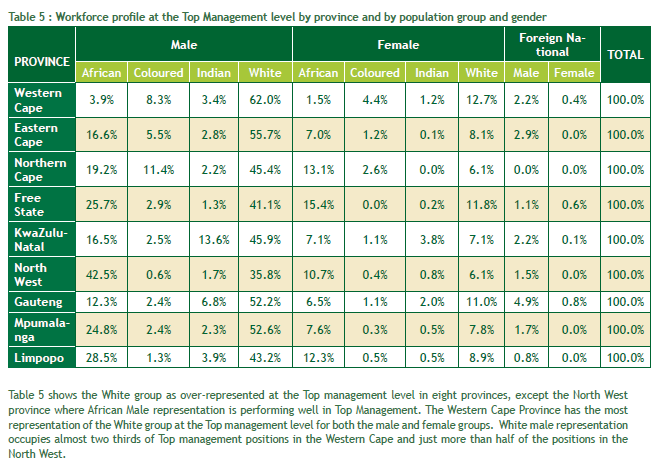COSATU Statement on the 14th 2013 Employment Equity Report
COSATU welcomes the rude awakening presented by the 2013 Employment Equity Report. We are very active in the labour market and have always said that whilst the general South African body politic has been saved from racism and the teachings of Verwoerd, the South African workplace still represents the past.
The Report confirms what we have always argued which is that the majority of our companies are still purely profit oriented and not concerned about social transformation. This is reflected by the heightened labour unrest that is brought about by their over-reliance on cheap labour and super-exploitation of workers. These companies have not embraced transformation as they continue not to have properly constituted consultation committees and even if they do such committees are used purely for the sake of their window dressing purposes
The major achievers of employment equity from the Report are not different from the major beneficiaries of apartheid. These are White Men and White Women. These two groupings have workplace representation figures that are way beyond their population percentage figures. Employers have whilst faced with the problem of addressing Black equity problems focused largely on the White Women as a very important group that needs particular focus in equity
The Report also highlight the fact that in the last Fifteen Years or so South Africa has only managed to move between 20-30% of Blacks in general into Senior Management positions. The three key findings can be summarised as follows
1. That white males still dominate Senior Management positions in largely the private sector workplaces. They have advanced higher than all other race group males as they have developed from a higher base than their counterparts. Many private sector companies still favour white males for senior management positions
2. White women have developed higher than any other group from equity programmes as private sector companies are now favouring them over groups. Black females on the other hand have the least advancements in equity compared to all other groups
3. Males in general (both Black and White) have in general had the better advancements than Black females.
The problem of employment equity in our country confirms the obvious, which is that employers or the so-called free market cannot advance the social cause of transformation. This is because they are very, very narrow and extremely short-sighted. There is a very poor recognition in those mostly lily white boardrooms that unless the entire human resource of the country is mobilised, the can be no meaningful economic development that can proceed in the country.
COSATU therefore calls for the country to observe both national and regional demographics to ensure that equity is properly guided by these. We call upon all companies and public entities to observe this as the basis of employment equity plans and advancements
We further call on all workers to take our Congress resolutions to effect by ensuring that their companies establish shop steward and management based employment equity forums. They also need to ensure that where skills development committees exist these two are merged so that the two transformational processes give effect to one another.
We also agree with the views of the Employment Equity Commission Chairperson Dr Loyiso Mbabane that "No country has addressed racial inequalities through free markets" This view is totally reinforced by the fact that the private sector compares very poorly to employment equity and skills development compared to the public sector.
This is due to the fact that very few company boards measure the success of their chief executives through good employment equity programmes but purely on the basis of higher capital returns only as such boards are composed of greedy investors themselves
Statement issued by Patrick Craven, COSATU national spokesperson, April 11 2014
Click here to sign up to receive our free daily headline email newsletter



